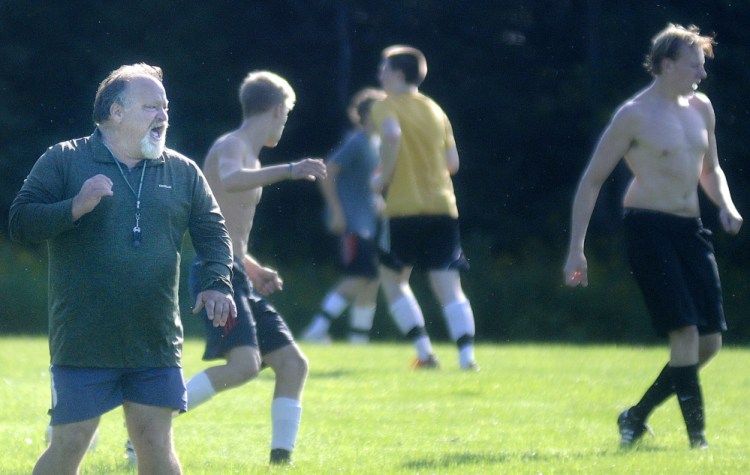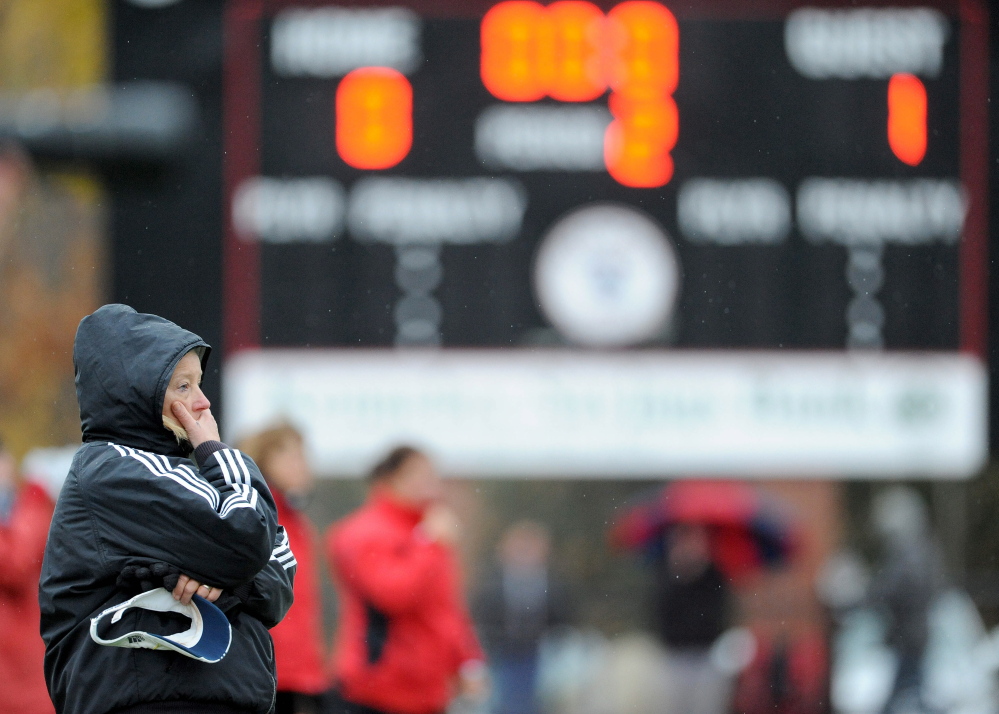Athletes and coaches agree that the two-week hands-off period in Maine high school sports is good for many reasons — family time, rest, and getting physically and mentally prepared for the upcoming fall season are chief among them.
Yes, it’s a time to relax, they add, but that doesn’t mean stocking up on junk food for marathon Netflix viewing parties.
“It’s a long time to not be doing anything,” Skowhegan goalkeeper and captain Leah Kruse said. “You can’t just sit around on the couch for two weeks.”
The mandatory hands-off period began Monday and continues until the opening of fall practices on Aug. 17. Teams in Aroostook County are exempt due to the potato harvest. Some have already begun practicing and have their first games late next week.
The Maine Principals’ Association implemented the dead period in the 1980s “(i)n order to provide a window of personal time similar to the time available prior to the winter and spring seasons,” according to the MPA soccer bulletin.
Over the next two weeks, coaches are prohibited from having contact with athletes except to continue to supervise an off-season conditioning program that they were involved in before the start of the hands-off period. They can not include any sport-specific drills in the conditioning program or organize or be involved in any team activities.
Coaches can get nervous when they don’t know what their players are up to for a prolonged period of time, but a little time away from their second family to be with their real family is vital for everyone, they said.
“I think it’s good,” Skowhegan field hockey coach Paula Doughty said. “I have four children of my own, and I think it’s important for coaches, players and parents to just enjoy their family time together. I actually wish it could be three weeks, to be honest.”
“Kids need a break. I need a break,” Maranacook boys soccer coach Don Beckwith added. “I think they are just kids still and everybody wants a piece of them. At least for these two weeks no one can get a piece of them.”
Kruse, who is entering her senior year, said she appreciates the free time, especially when everything becomes a time crunch in a couple of weeks.
“It’s important to spend time with your family because during the season we have a lot of field hockey, so it’s difficult to spend a lot of time with the family,” Kruse said.
Kruse estimates that before the hands-off period, she spent six-to-10 hours per week on field hockey-related activities over the summer. That doesn’t include going to the gym three times a week for an hour, a four-day team camp at Bentley University or her twice-a-week practices with the Maine Majestix club team, which continue through the hands-off period.
The MPA forbids teams organizing “captains practices” during hands-off. Players are allowed to work out together on school property if it is part of their conditioning program and isn’t anything organized by coaches, parents or boosters.
In this age of social media, it’s very easy to round up a group of players for an impromptu workout, Kruse said.
“There are a couple of times where we’ll message each other, like ‘Hey, the seniors are going to the field. If anyone wants to come we’d like you to come,'” she said.
“The most important part of the dead period is keeping your fitness,” she added. “We worked very hard this summer on our fitness and we can’t let that go.”
Coaches’ biggest fear is players getting away from their conditioning and increasing the risk of injury when practices start up again, Doughty said.
“It only takes three or four days to lose it. And once you lose it, that’s when you can get hurt,” Doughty said. “We don’t plan anything for the kids, we’d hope that they’d maintain fitness. Some kids will condition and some won’t.”
Coaches usually accept that uncertainty as part of high school sports. MPA assistant executive director Mike Burnham said violations of the policy are very rare.
“I think coaches, athletes and their families all look forward to the down time,” he said.
He said the rule does create some confusion, however.
“We get clarifying questions, such as if a kid goes to basketball camp this week, is that a violation, or if his coach is there, is that a violation,” he said.
Athletes are allowed to attend camps on an individual basis during the period, but their coach can not work at the camp.
Burnham said the hands-off period is a good time for athletes to look for guidance from other school personnel who are not covered by the policy.
“What we say to schools with full-time trainers is what a great opportunity for your trainer to get involved with these kids through the conditioning program, whether its soccer, field hockey, football or cross country,” he said.
Changes to the policy aren’t on the horizon, Burnham said, although athletic administrators sometimes discuss lengthening the period or moving it to another part of the summer.
Kruse says don’t change a thing.
“I think the dead period is perfect how it is,” she said. “I’ve heard people say they wish it was at the beginning of the summer and I wouldn’t prefer that. It’s a good time for us to reflect on the past season and what you did over the summer and look ahead to field hockey season.” ”
It’s also the period leading up to school,” she added. “So, you’re like, ‘Wow, are you really going to fit in all of the stuff you want to do before school starts?'”
Time’s running out.
Sports editor Bill Stewart contributed to this story
Randy Whitehouse — 621-5638
rwhitehouse@mainetoday.com
Twitter: @RAWmaterial33
Send questions/comments to the editors.




Success. Please wait for the page to reload. If the page does not reload within 5 seconds, please refresh the page.
Enter your email and password to access comments.
Hi, to comment on stories you must . This profile is in addition to your subscription and website login.
Already have a commenting profile? .
Invalid username/password.
Please check your email to confirm and complete your registration.
Only subscribers are eligible to post comments. Please subscribe or login first for digital access. Here’s why.
Use the form below to reset your password. When you've submitted your account email, we will send an email with a reset code.